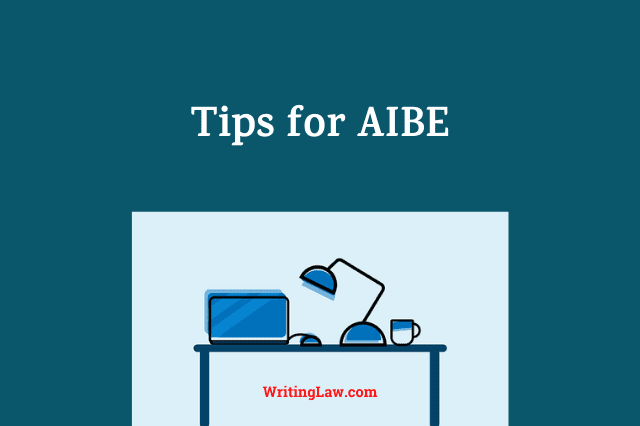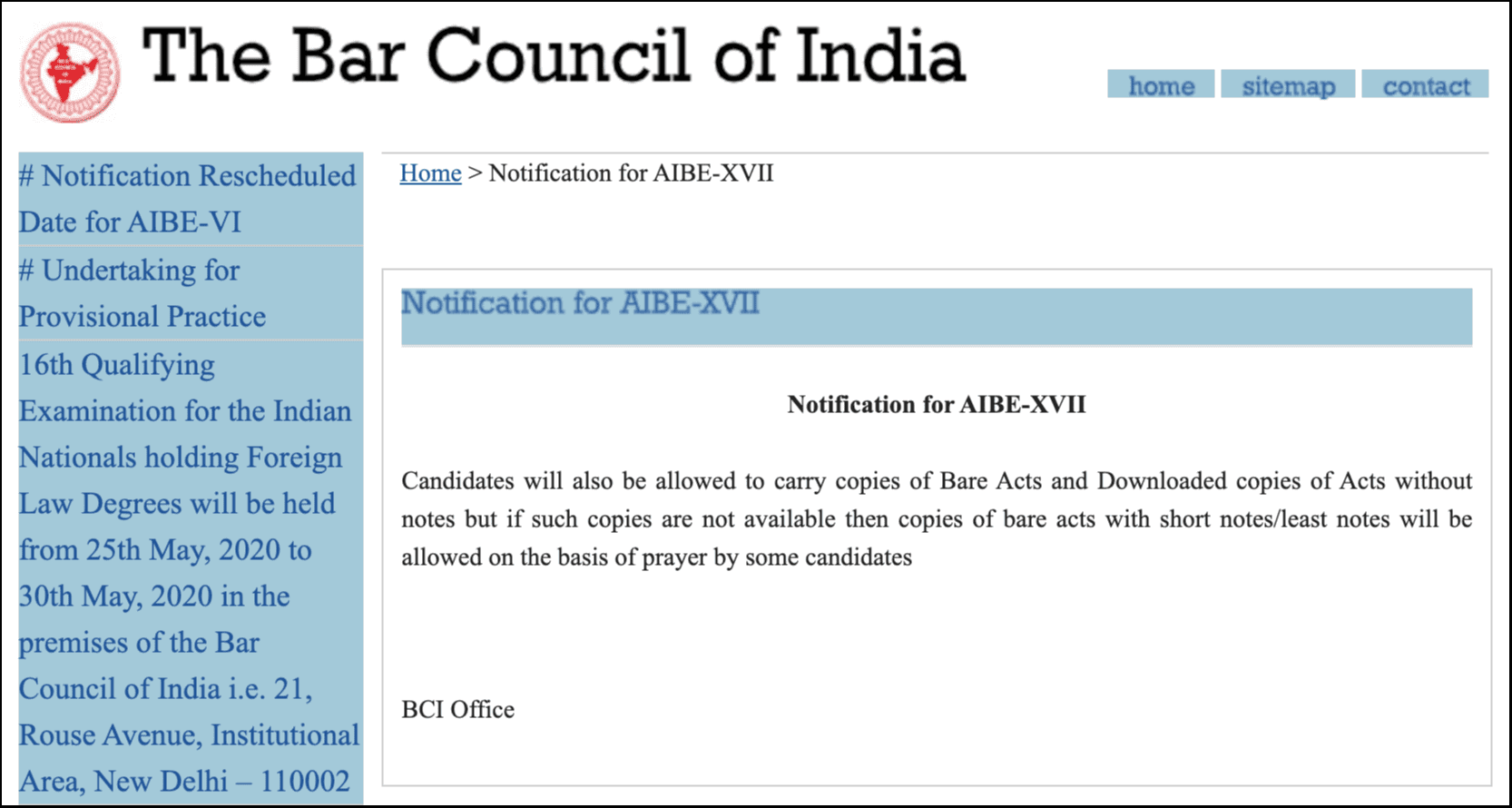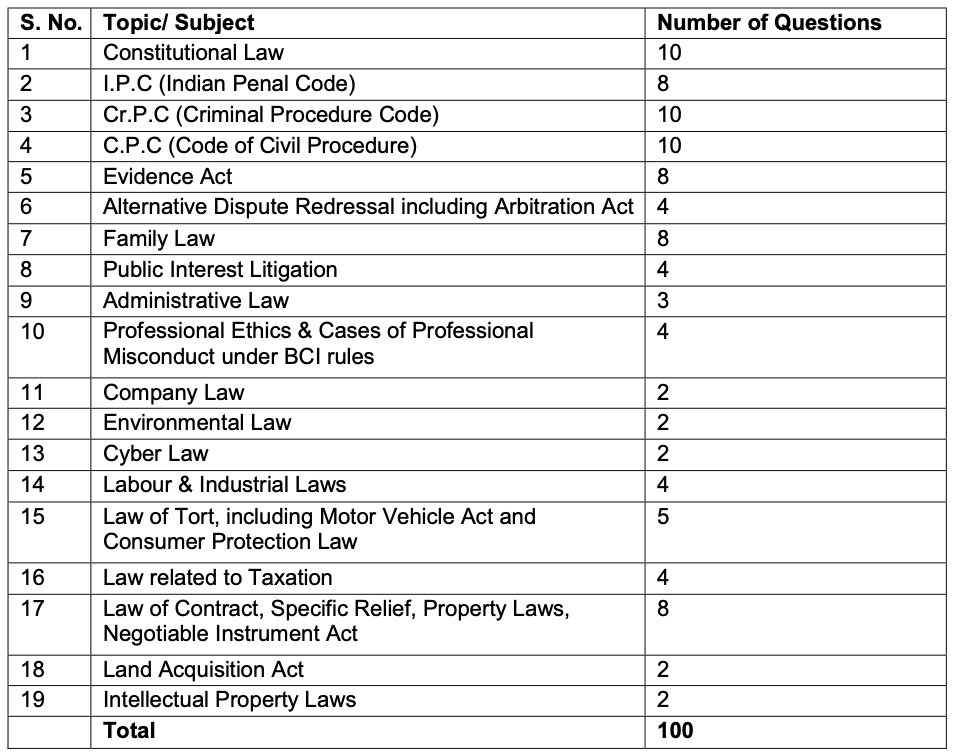
After you complete the 3-year or 5-year LLB degree from a Bar Council of India-approved institute and meet the other requirements, you’re eligible for the All India Bar Examination (AIBE). Once you pass this certification exam, you get the Certificate of Practice (COP). This permits you to practice as an advocate in Indian Courts. Without passing the All India Bar exam, you cannot practice in any court. See this page till the end.
Q: Do students who have passed LLB before 2005 need to appear in AIBE?
Ans: No. AIBE is only for students graduating from the academic year 2009-10 onwards. If your law degree was awarded before the academic year 2009-10, there is no need to appear for the All India Bar Examination or qualify for this exam to practice law in India.
Q: Are final-year law students eligible for AIBE?
Ans: No, final-year law students are not eligible for AIBE. One needs to be enrolled in the state Bar, and then they can appear in the All India Bar Examination.
11 Tips for Passing the AIBE Exam
Here are some important information and tips to keep in mind for the All India Bar Examination. These will ensure that you have an easy time sitting in the exam hall and are confident in solving the questions.
1. Starting with AIBE XVI, you can no longer take notes, printouts, or anything except physical Bare Acts books inside the AIBE exam hall. Therefore, make sure you have bought the Bare Act books that you can take inside.
Update for AIBE-XVII and later: The Bar Council of India recommends you take physical, actual Bare Act books without notes. It also uses the term “downloaded copies, ” meaning you may be able to take printouts (that’s what downloaded copies mean).
Further, it says that if you can’t find Bare Acts without notes, then Bare Acts with short notes or least notes can be allowed if the candidate requests. Here’s the full official notification by the Bar Council of India.

2. There are 100 multiple-choice questions in AIBE. There is no negative marking. So, make sure you do not leave any questions unanswered.
3. You pass the All India Bar Exam if you get 40% of marks in the general category and 35% marks in the SC/ST category. That is, general category candidates have to get 40 out of 100 questions correct. SC/ST have to get 35 correct answers out of 100.
4. After the exam, you either pass or fail. Bar Council doesn’t show the exact marks you score.
5. Questions in AIBE aren’t very tough. They are challenging, but you can easily solve them.
6. You don’t need any law notes for AIBE. Just focus on Bare Acts. Plus, with the syllabus subjects (given below), make sure you focus well on legal maxims and some of the landmark case laws.
7. If you have been reading Bare Acts and the syllabus subjects mentioned below for a few months, you’re good to go. Plus, you’ll have the Bare Act books during the exam. So, it’s easy.
8. Read the questions carefully. Several of them can be solved just by reading the question and seeing the index page of the Bare Act of that question. Truly. Read the question. By the language and a few facts, you’ll get to know what the subject is. Now, open that Bare Act book’s index page and it should help you solve the question. If you need to dive more, quickly go to that Article or section using the page number mentioned in the index.
9. Personal Experience: Since this isn’t a competitive/job exam, people are usually friendly inside the hall. I don’t know about other states or exam halls or anything similar. But while I was taking the exam, candidates sitting near me gladly offered books I didn’t have, etc. So, overall, it was easy to solve the questions.
10. There are 100 questions, but if your language understanding (English or in which you are appearing) is good, you can solve them soon and will have ample time in the end to recheck.
11. Once again, in any case, do not leave any questions unanswered. Remember, there is no negative marking!
Syllabus for AIBE
This is the syllabus for All India Bar Exam XVIII:

According to the official AIBE website, these are the subjects for AIBE XVIII that took place in December 2023:
- Constitutional Law (10 questions)
- Indian Penal Code (8 questions)
- Criminal Procedure Code (10 questions)
- Code of Civil Procedure (10 questions)
- Evidence Act (8 questions)
- Alternative Dispute Redressal, including Arbitration Act (4 questions)
- Family Law (8 questions)
- Public Interest Litigation (4 questions)
- Administrative Law (3 questions)
- Professional Ethics & Cases of Professional Misconduct under BCI rules (4 questions)
- Company Law (2 questions)
- Environmental Law (2 questions)
- Cyber Law (2 questions)
- Labour & Industrial Laws (4 questions)
- Law of Tort, including Motor Vehicle Act and Consumer Protection Law (5 questions)
- Law related to Taxation (4 questions)
- Law of Contract, Specific Relief, Property Laws, Negotiable Instrument Act (8 questions)
- Land Acquisition Act (2 questions)
- Intellectual Property Laws (2 questions)
AIBE has a total of 100 questions from the subjects mentioned above, and the time duration for the exam is 3 hours 30 minutes.
How to Use WritingLaw’s Bare Acts and MCQ Tests to Practice for AIBE
Things needed for the perfect experience:
- A mobile phone or laptop.
- Physical Bare Act books. If you don’t have physical Bare Act books, open WritingLaw’s PDFs on your mobile or laptop.
How to practice for AIBE:
- Step 1: Open WritingLaw’s MCQ Tests on your phone or laptop.
- Step 2: Keep your Bare Act books near. Or, open WritingLaw’s Bare Act PDFs on another phone, laptop, or the same phone.
- Step 3: Start the MCQ test.
- Step 4: Solve the test questions by seeing the Bare Act books or PDFs.
- Step 5: Once done, see your test score. Anything above 50% in these tests is excellent for AIBE.
- Step 6: Take another test or refresh the page to retake this same test.
AIBE Bare Acts
Out of the subjects mentioned above, WritingLaw has Bare Act PDFs for the following subjects. You cannot carry PDFs inside the exam hall but use them to study and prepare for AIBE now. You can buy these PDFs and many other PDFs for Rs 340. The Bare Act names are listed below.
WritingLaw Bare Act PDFs
You can read from these PDFs on your mobile, tablet and laptop to prepare for AIBE and all other law exams. These are useful throughout your legal career.
Practice Questions
As mentioned above, AIBE has multiple-choice questions. Out of the above AIBE syllabus, WritingLaw has MCQ Tests on the following subjects. You can buy all the PDFs, the tests mentioned below, and several other things for Rs 1325.
WritingLaw MCQ Tests
These MCQ Tests have important questions that are of judiciary exam level. This makes them useful for all lower law exams, too. If you do well in these tests, passing AIBE and similar law exams should be easy for you.
Do not wait for the last moment or the one month before AIBE. For the best preparation, read from the Bare Acts and practice via the MCQ Tests starting today.
All the best for AIBE.
- Article 334A of the Constitution of India - 14th April 2024
- Article 332A of the Constitution of India - 14th April 2024
- Article 330A of the Constitution of India - 14th April 2024








Names of Bare Act books may please be suggested. I think those students have passed the LLB before 2005, need not require to appear AIBE exam
The relevant Bare Act names are already mentioned in the post. If you are looking for good law books suggestions, please see this. And yes, those who passed LLB before 2005 do not have to appear in AIBE.